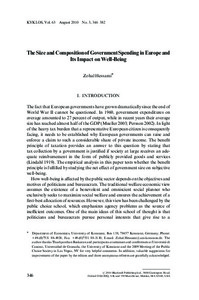The size and composition of government spending in Europe and its impact on well-being

Kyklos. International Review for Social Sciences
2010
63
3
346-382
government attitude ; public expenditure ; statistics ; well being
Social protection
English
Bibliogr.
"This paper empirically analyzes whether large governments in Europe reflect efficient responses to a changing social and economic environment (‘welfare economic view') as opposed to wasteful spending (‘public choice view'). To this end, the effect of government size on subjective well-being is estimated in a combined survey and country-level dataset covering 153,268 respondents from twelve EU countries over the 1990–2000 period. The first finding is an inversely U-shaped relationship between government size and well-being. In addition, the analysis suggests that given the high institutional quality as compared to other parts of the world there might be scope for a further enlargement of governments in the EU from a well-being perspective. However, one must acknowledge that the effect on well-being may be quite small and that democratic societies in Europe have no experience with even larger governments. The investigation also reveals that the impact of government size on well-being depends negatively on levels of corruption and positively on the extent of decentralization. Moreover, left-wing voters and low-income earners are the main beneficiaries of a large public sector. Finally, in all twelve EU countries included in the sample higher levels of well-being could have been achieved by allocating a higher share of public resources to education, while Finland and Germany could have given an additional boost to well-being by cutting expenditures on social protection."
Digital
The ETUI is co-funded by the European Union. Views and opinions expressed are however those of the author(s) only and do not necessarily reflect those of the European Union or the ETUI.